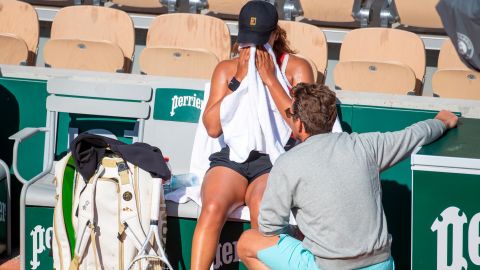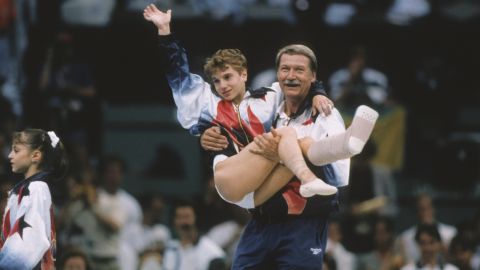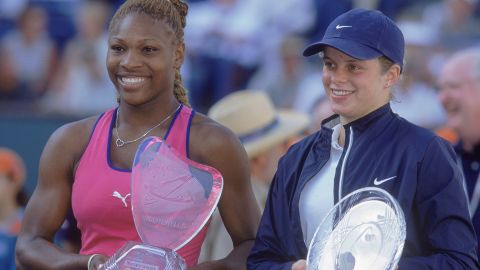[ad_1]
Editor’s Notice: “United Shades of The usa with W. Kamau Bell” airs Sundays at 10 p.m. ET. To capture up on past episodes, together with one on athletes and mental wellness, go to CNNgo.
CNN
—
One particular 12 months in the past, Simone Biles suddenly withdrew from the Tokyo Olympics just after struggling with the “twisties” – leaving the other members of Group United states of america to contend without her.
Biles’ move rippled throughout Tokyo and the globe. In an psychological job interview right after her withdrawal, Biles claimed she required to guard “her body and thoughts.”
“Whenever you get in a significant worry problem, you sort of freak out,” she told reporters at the time. “I have to concentration on my mental wellness and not jeopardize my overall health and properly-remaining.”
For longtime enthusiasts of gymnastics, Biles’ move was somewhat unprecedented. At the 1996 Olympics in Atlanta, for illustration, Kerri Strug famously broke her ankle on the vault but continued to carry out wounded. Workforce United states of america gained gold that year. Strug retired soon after.
Athletes are normally rewarded for supplying almost everything to their activity, irrespective of the mental well being effect. Coaches need it fans demand it.
But in current several years, a change is developing. In a new episode of “United Shades of The us,” host W. Kamau Bell digs deep into the intense stress going through some of the country’s beloved athletes – and the authentic mental wellness cost of profitable.
Biles’ withdrawal was a person of the most high profile situations of an athlete talking up about their mental health and fitness, but she’s not the only a person to do it.
Tennis star Naomi Osaka has been open about her struggles with melancholy, going so considerably as to withdraw from the French Open in 2021. This 12 months, Brooklyn Nets’ Ben Simmons reported he “had some darkish times” during his large-profile feud with his former workforce the Philadelphia 76ers. And at the Wintertime Olympics in Beijing this February, athletes from various sports activities spoke up about the pressures going through Olympians.

“I really feel like it was a match changer,” snowboarder Anna Gasser informed the New York Periods, of Biles’ withdrawal in Tokyo the calendar year prior to. “Simone Biles’s information was that we’re not just athletes — that we are also human beings and not robots.”
But that concept hasn’t usually existed in the past. Specially taking into consideration how much revenue numerous athletes make, there can be a inclination to put stress on athletics stars to perform no subject the price.
“(There’s) this strategy that your health and fitness is irrelevant,” Renée Graham, a columnist and editor at the Boston Globe, informed Bell. “That your career is to be a exhibit horse and get out there and entertain the folks, and you make a lot of revenue to do that. That ugliness is impossible to divorce from what professional sporting activities is.”
Strug, the gymnast who done on a damaged ankle at the Olympics in 1996, informed her coach – Bela Karolyi – that she wasn’t sure she could do the stunt on her damage. But Karolyi stated she could, in a transfer that at the time was deemed good coaching, Bell mentioned.

Considering that then, there have been many reports and allegations of Karolyi currently being bodily and verbally abusive to the women he coached. In reaction, Karolyi as soon as explained: “My gymnasts are the greatest organized in the environment, and they acquire. That’s all that counts.”
For athletes of colour, racism can make mental health and fitness problems even even worse as they also confront all the common problems of their job.
“Too a lot of occasions we believe of things like ‘this is racism’ and ‘this is mental well being,’ and they’re independent,” said Kristi Oshiro, an assistant professor at Belmont College who has studied racism and its impact on athletes. “But in fact, it’s actually complicated and they advise just one yet another.”
Serena Williams, just one of the biggest tennis gamers of all time, confronted racist abuse from tennis lovers back in 2001, in a finals match against Kim Clijsters at Indian Wells. Nevertheless Williams, just 19 a long time aged at the time, received the match, she refused to participate in the match once again until eventually 2015.
“It has been complicated for me to ignore paying hrs crying in the Indian Wells locker space right after successful in 2001, driving again to Los Angeles feeling as if I had shed the biggest sport at any time – not a mere tennis activity but a larger combat for equality,” Williams stated about her return. “Emotionally it appeared much easier to remain away.”
The implications of the intersections of racism and psychological health and fitness exist at all levels of enjoy, Oshiro explained. With expert athletes, while, the pressure can be much more rigorous.
“For professional athletes it’s a minimal unique and distinctive for the reason that they are expected to contend and constantly carry out at this ridiculously elite degree of perform, all though getting open up or susceptible to criticism from individuals all over the planet,” she mentioned.

And in the age of the world wide web, that criticism can come from any place – both in man or woman and on-line.
Grant Williams is an NBA participant for the Boston Celtics. He pays focus to all the responses he gets from admirers, he advised Bell, notably if they are racist.
“It’s difficult not to detect it,” Williams stated.
With additional athletes speaking up about the psychological health and fitness pressures of their sport, the diversity of their tales is hanging. From Biles and Osaka to the NBA’s Kevin Love and former faculty volleyball participant Victoria Garrick – athletes throughout a array of ages, races and sports have all opened up about their mental wellness struggles, highlighting the assorted approaches these concerns can manifest.
Oshiro is a previous college or university athlete herself, owning played softball at East Carolina University. Just in the last 10 several years, she claimed, discussions about psychological health have advanced for the far better.
“When I performed in school, we not only lacked the appropriate methods but the awareness and also the language to describe the mental wellbeing struggles or even the racism that we endured at the time,” she stated. “It was like you understood you were being going by some things, but you didn’t know it was maybe depression or stress and anxiety.”
Randy Moss, NFL hall of famer, started out tearing up on ESPN previous year when talking about a racist electronic mail despatched by former NFL mentor Jon Gruden. At the time, some football admirers known as Moss “soft” for letting his thoughts show.
To generate sustainable modify all over perceptions of athlete psychological wellness, Oshiro said, anyone involved should reconsider the approaches they think and chat about athletes – from fans to stakeholders. Even businesses can do a improved job of explicitly not tolerating racism that can frequently be imposed on athletes of shade.
But that is not all that can be finished. Obtain to mental wellness resources is also vital, Oshiro said.
“When you seem at how lots of points are obtainable for athlete physical overall health – schooling services, bodyweight rooms, so on and so forth – there is a good deal of get the job done that requires to be finished to make absolutely sure it is even for psychological health, as well,” she reported.
And if we simply cannot care about equally their bodily exercise and their psychological very well-being, as Bell notes in Sunday’s episode, then it’s possible we do not are worthy of athletes at all.
[ad_2]
Supply connection







